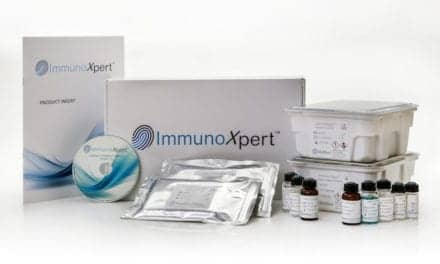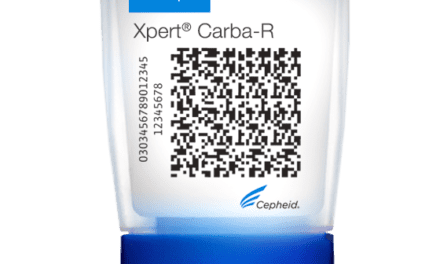An Interview With Reda Iskarous, President
The company name LGP Consulting Inc suggests, well, a consulting company. While that’s exactly what it was all about when it was founded at the dawn of 2000, there is more to this company than meets the eye. LGP Consulting Inc began to reorganize and reshape itself and its focus 3 years later as it entered the field of distribution with CLINICON AB’s Pluggo decapper. Now, the company takes both sides of its business—the consulting side and the distribution of the Pluggo decapper—seriously and sees it all as part of the larger picture of helping laboratories that are forced to work with less while producing more. We spoke with LGP Consulting President Reda Iskarous about the company’s dual nature, its plans for the future, and the challenges of the everyday laboratory.
CLP: Can you tell me a little bit about the history of LGP Consulting Inc?

In 2003, we introduced a second division to our company—the assembly, marketing, sales, and support of the Pluggo decapper in North America. We formed an alliance with the Swedish company CLINICON AB for the rights for the Pluggo decapper to provide these services. All aspects of developing new modifications and/or adaptations for the North American market are conducted at our facility. We provide all the warranty and service support for the Pluggo decapper in North America.
CLP: What needs does the company satisfy within the clinical laboratory market?
Iskarous: The Pluggo decapper is a safety device that protects the laboratory staff from repetitive stress injury, carpal tunnel syndrome, and the exposure to biohazardous aerosols during decapping of body-fluid collection tubes.
Laboratories face major challenges today as budgets are minimized. Medical technologists are becoming rare commodities while production is expected to increase. Basically, the demands can be summed up as “more for less.” Our consultative services provide experience and simulation tools to best provide answers for today’s laboratory professionals. We offer more services and increased productivity to overcome the challenges of less money and fewer personnel.
CLP: How do the two business areas of consulting and decapping safety work together within your company? Do these areas of the company work together at all?
Iskarous: We keep the two sides of the business separate from each other. The Pluggo decapper requires sales activities in the laboratory market, while we view our consultative role as a partnership with laboratories to solve everyday issues. Therefore, we separate these two parts of our company so that our consultative role is not used as a means of selling the Pluggo decapper.
CLP: Tell me about the consulting side of your business.
Iskarous: Once we are contracted for our services, our team visits the laboratory to evaluate the present operations. We observe the laboratory’s procedures and why things are done the way they are. We travel with the sample tubes to evaluate the routes they take, the various stops they encounter, and what happens at these various stages. We evaluate the methods used to transport, stage, and analyze the sample tubes. We also study the patterns of sample-tube arrivals versus the staffing levels of the laboratory. The use of equipment is evaluated to assess its use during the various stages of the day. We require data obtained from the laboratory information system for specific time periods. Also, floor plans and layouts are obtained to assess the physical space available and its present use.
Once we observe and collect all the data required we head back home, where we conduct an in-depth data analysis. We utilize various tools to conduct this analysis, some of which include the use of discrete event-simulation models customized for the specific laboratory.
Once the analysis is completed, reports and presentations are compiled to address the findings and the recommendations for the specific laboratory. Our recommendations lead to a more lean, streamlined, productive, and efficient laboratory that is able to grow and handle additional workload with fewer resources.
CLP: What are some of the biggest challenges clinical labs face today? How have you helped them deal with these challenges?
Iskarous: The biggest challenge is scarcity of the medical technologist. Many labs have open positions that they cannot fill, or that could take 3 to 6 months to fill. This in turn creates a stressful environment for the existing medical technologists, because they have to work additional overtime hours that further strain the budgets of the laboratory. At LGP we pride ourselves in providing comprehensive plans for our customers that allow them to operate and handle additional growth with the reduced staff levels that they have to operate with, while reducing or eliminating excessive overtime hours.
CLP: Why is the Pluggo decapper such an important product for clinical labs? How do you believe it fits within the larger marketplace? What impact do you believe it has had in terms of speed and safety in removing stoppers from vacuum tubes?
Iskarous: Although the Pluggo decapper is a safety product, the high throughput of 3,000 tubes per hour and its condensed footprint, 10 x 16 inches, come as a great bonus to our customers. Again, with the medical technologist average age continuing to rise, the manual decapping of stoppers is becoming a safety issue that creates excessive injury to the hand and wrist. The Pluggo decapper is a solution with a low price, a small footprint, and demonstrated safety. Even the smallest lab could use the Pluggo decapper, as an injury could occur from just one tube. Regarding the larger-volume labs, again, we pride ourselves on the fact that the Pluggo decapper has been very effective in many of the largest reference labs and regional blood-bank centers in the United States. Again, the small footprint, low price, and high throughput has allowed the larger labs to benefit from the safety feature the Pluggo decapper provides, and the high throughput is three times faster than the manual decapping process.
We have, for the past 14 months now, successfully entered the NAT Lab and PCR Lab environment. This is due to the special protective cover that LGP has developed to go along with the Pluggo decapper.
CLP: What trends do you see impacting the clinical lab industry? How is LGP Consulting Inc adapting and responding to these trends?
Iskarous: The laboratory environment is under pressure to operate with the least resources and yet yield highest production. This is emulating the manufacturing demands. Therefore, LGP is geared to provide LEAN and Six Sigma standards to the laboratory operation in order to meet, operate, and produce at the new demands the laboratory is facing.
CLP: What products and/or services does LGP Consulting Inc plan to offer in the near future?
Iskarous: In addition to our present services, we are planning to develop a recapper, as this manual action is as dangerous to the technologist as the decapping process.
CLP: What are some of the challenges your business has faced over the years? How have you overcome them?
Iskarous: Coming from the consulting field and adding the manufacturing field to our operations gave us the ability to practice what we preach. As explained earlier, a successful manufacturing operation has to operate within a strict structure to yield the highest efficiency. Soon after we started the Pluggo project, we turned our workflow-consulting role inwards to assess our manufacturing practices, and we were able to identify, analyze, and provide a plan to maximize our efficiency and production. We are proud to say that we have leaned and streamlined our operation very effectively.
CLP: Where do you see LGP Consulting in 5 years?
Iskarous: It is always a desire to continue to expand our consultative services and grow our team in this area as the demands for our services continue to increase. In 5 years, we would like to have developed and successfully launched our recapper. Also, we would like to have a new product identified and developed by that timeframe.
CLP: What would you like CLP readers to learn about LGP Consulting Inc?
Iskarous: LGP Consulting was founded by a medical technologist. Therefore, we are driven to service the laboratory and its staff. It is our goal to continue to provide the best services possible, whether it is consultative or manufacturing, to our customers. Our vision is to assist each laboratory we encounter, and its staff, in order to provide the best and fastest services to their patients and physicians. Our collective goal is supreme patient quality care.
Michelle Said is associate editor of Clinical Lab Products.




